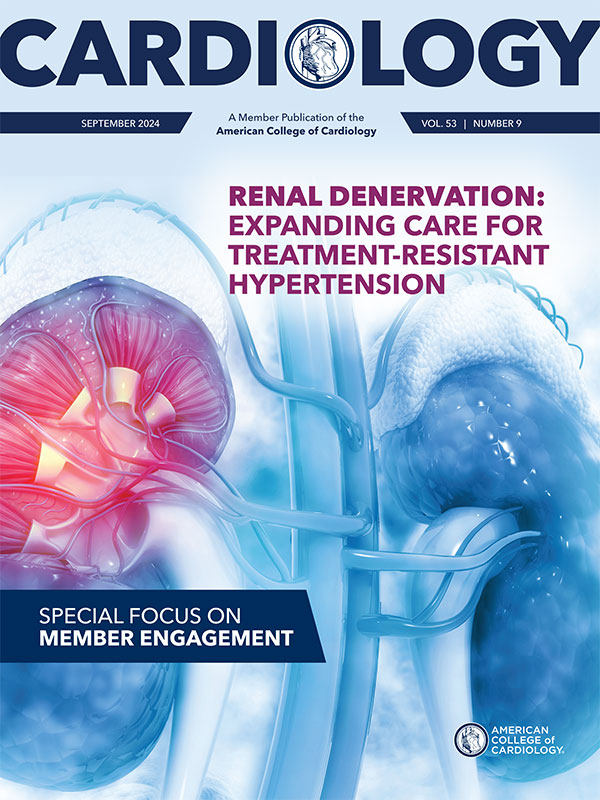Feature | How Florida Pioneered the ACC's Modern State Chapter System

The first meeting of the ACC's Florida Chapter was held on Sept. 15, 1987, in Orlando, setting the stage for the birth of today's State Chapter system as we know it.
The meeting had been a long time coming and was a culmination of two years of hard work by a group of Florida cardiologists led by Roy M. Baker, MD, FACC, and joined by ACC luminaries Henry McIntosh (ACC President 1974-1975), Richard Conti, MD, MACC, (ACC President 1989-1990) and Carl Pepine, MD, MACC, (ACC President 2003-2004), who recognized a need for cardiologists to have a voice with state legislatures, payers and state medical associations.
The ACC already had Governors for each state, but they typically were used to review credentials of prospective members. Indeed, the College historically had chapters until dissolving them in 1954, according to records in the ACC archives.
Thanks in large part to their commitment and perseverance, ACC leaders passed a constitutional amendment in March 1986 favoring the development of Chapters in their current form. This action was closely followed by the granting of provisional Chapter status by the Board of Trustees to two inaugural State Chapters in Florida and Arizona, respectively.
Collaboration and Learning
Former Chapter President Benny Maniscalco, MD, FACC, recalls the importance of the first Florida Chapter meeting in bringing clinicians "together to solve local and state problems, address legislative and payor issues, obtain valuable education, and meet colleagues!"
This commitment to education and networking continues to be a foundational element of the Chapter's work to this day. Attendance by national ACC leaders helps to highlight the College's overarching strategic priorities and make connections to the hot topic issues impacting the broader cardiovascular profession.
Even more importantly, active input from senior state leaders, like past ACC presidents McIntosh, Conti, Pepine and Leonard Dreifus, MD, MACC, are also key to chapter meeting success.
In 2006, the Chapter's bylaws were amended to incorporate the broader cardiovascular care team, allowing for greater collaboration and integration across the entire profession and driving positive change in the Chapter.
Other meeting innovations include a partnership with the Florida Heart Research Foundation to provide scholarships, funded by sales of special license tags, for cardiovascular researchers in Florida.
Recipients were chosen by a Florida Chapter committee and presented at the annual meeting. These efforts, in turn, stimulated the practice of abstract and poster presentations by trainees at the annual meeting.
In 2016, an interest in sharing local and regional quality improvement efforts prompted David Winchester, MD, MS, FACC, to develop the "FL QUIC" program. The goal: "…to collect stories in order to highlight what our members are doing to improve quality cardiovascular care in Florida." Presentations and awards are now a part of the annual meeting.
Driving Broader Change

Often, the issues addressed at the Florida Chapter meeting mirrored or were a precursor to national trends. For example, in 1986, then-ACC Florida Chapter President Pepine requested a group look into issues surrounding billing and reimbursement practices in Florida. Maniscalco, along with Rich Berger, MD, FACC, and Ray Howard began a series of meetings with the Medicare Administrative Contractor in Jacksonville.
The outgrowth of these meetings was development of a mutual collaboration for fair and appropriate evaluation and payment for physician services and the development of more straightforward policy.
"New" services such as balloon angioplasty and PET scanning were addressed alongside old issues such as electrocardiogram interpretation. Some of this work presaged the development years later of ACC Appropriate Use Criteria (also an initial outgrowth of work with insurers).
Other examples, include a high school visitation program created by McIntosh and Mike Nocero, MD, MACC, in the late 1980s to talk about careers in cardiology; an early free version of an electronic health record developed by Berger; and a push by Donnie Rosenberg, MD, FACC, for an increase of EMTs in ambulances (which were usually staffed by "drivers").
Former Florida Chapter leaders have also had an impact on broader ACC activities. In the early 1990s, Nocero pressed ACC to develop a "website," then a new idea, while Steve West, MD, FACC, and Peter Alagona, MD, FACC, helped to plant the seeds for the creation of what is now the ACC HeartPAC.
The Future
As the ACC Florida Chapter approaches its 40th anniversary in 2026, it's important to reflect on its role in where the College and its cadre of State Chapters are today. Not only have Florida Chapter leaders gone on to play major roles in charting not just the Chapter's future, but that of the broader ACC, stories of innovation, quality and global collaboration abound. Growing and sustaining this legacy is the focus for years to come.
Magical Moments

After experimenting with various locations, the Florida Chapter settled on permanently holding its annual Chapter Meeting at Disney World in Orlando beginning in the early 2000s.
The tenor of the meeting evolved too. As a scientific gathering for practicing and academic physicians, the need for more social interaction became increasingly evident. In 2003, then-Education Chair Jamie Conti, MD, FACC, pivoted the meeting to be more family friendly. Gone were the suits and ties of the President's Dinner! Now, there were Disney-hosted "kid's tables," balloon hats and hula dancers. Young families (and some grandparents) were drawn to "contests" that included kids: cooking competitions, fruit racers ("pinewood derby with pineapples") and even sumo wrestling!
This year's meeting was held Aug. 9-11 and was centered around the theme of "Where Science Meets Patient Care."
This article was authored by Richard A. Chazal, MD, MACC; David Winchester, MD, FACC; and Carl Pepine, MD, MACC.
Keywords: Cardiology Magazine, ACC Publications, Florida, Trustees, Quality Improvement

